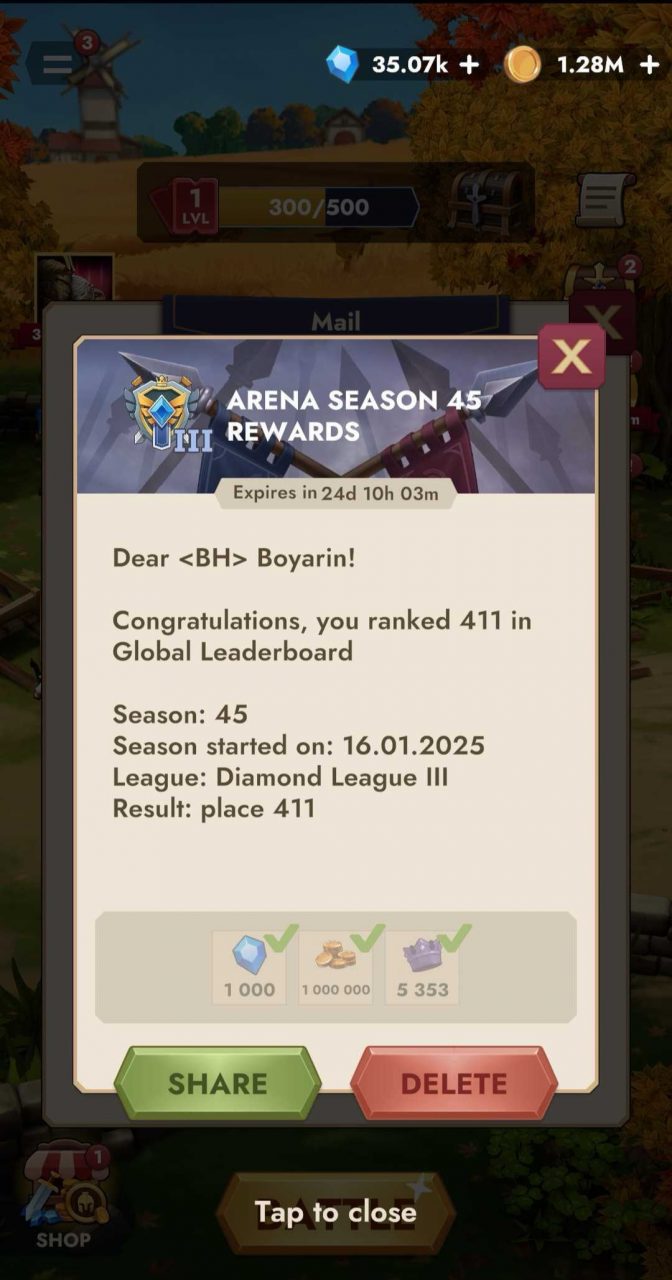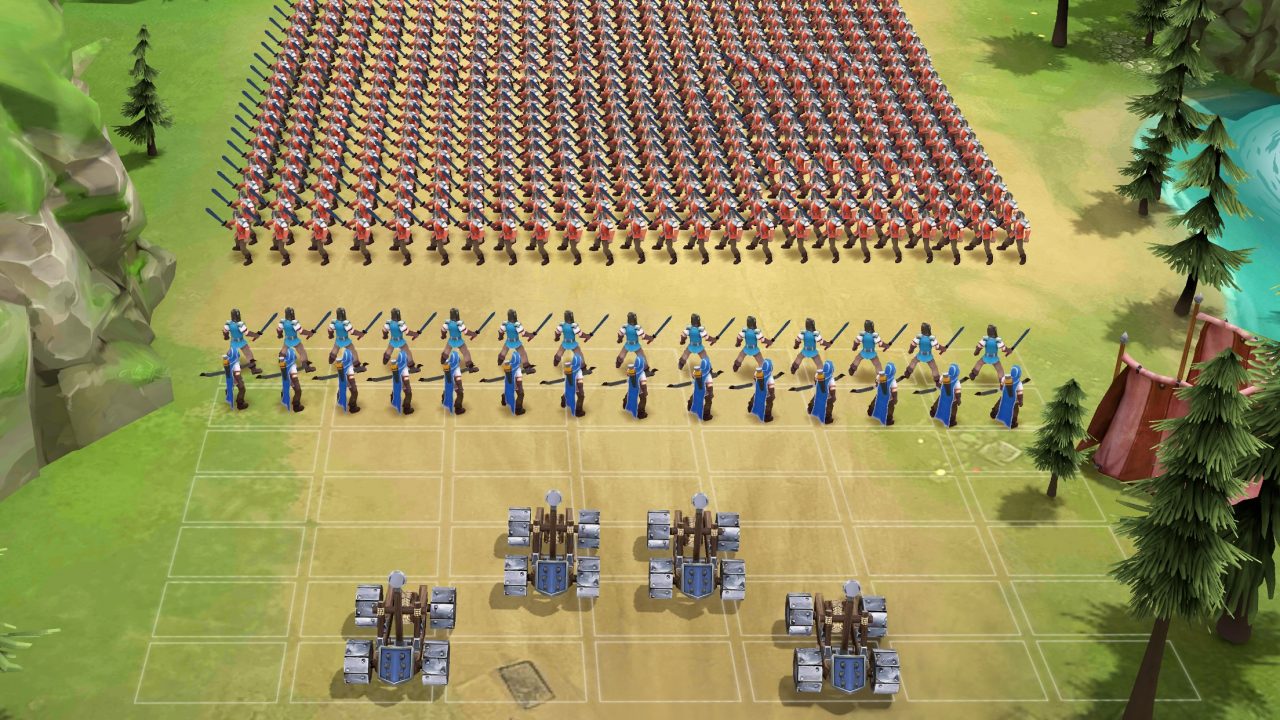The nuances of matchmaking in Kingdom Clash: Finding balance and fighting exploits
Within the first month of Kingdom Clash’s release, it became clear that the PvP arena was the heart of the game. It wasn’t just the main driver of monetization—it quickly became a major draw for players. The game’s community buzzed with discussions about tactics, lineups, and army compositions for PvP battles.
From the start, we wanted fair competition. Players should be able to climb the ranks organically, in-app purchases shouldn’t disrupt the balance, and cheaters shouldn’t be able to exploit the system. But in reality, that’s easier said than done. Players demand fairness—but they’re also quick to exploit loopholes if it helps them climb the rankings. And balance settings don’t just affect gameplay; they directly impact monetization.
So, our challenge was clear: strike a balance between competitive fairness and other key metrics in this asynchronous battler.
Leaderboard system & PvP matchmaking
Matchmaking in the Kingdom Clash arena is based on the Elo system—the same one originally designed for chess rankings. The concept is simple: winning against a higher-ranked opponent earns you more points; if your opponent is lower than you on the leaderboard, you get fewer points.
This system, first developed in the mid-20th century, turned out to be a great fit for battlers and leaderboard-based games. It’s efficient, requires minimal data tracking (only six parameters), and allows for quick and convenient calculations.
At the start of each new season, all players receive a starting rating. Before every battle, the system compares both players’ ratings and calculates how many ranking points are up for grabs based on that difference. Beating a higher-ranked opponent grants the full point value, beating an equal-ranked opponent grants around half the point value, and beating a lower-ranked opponent grants only a small portion of the points.
Players progress through six leagues: Bronze, Silver, Gold, Platinum, Diamond, and Master League (reserved for the most hardcore competitors). The more wins against equal or stronger opponents, the faster a player moves up. At the end of the season, players receive rewards based on their final ranking.

While we unanimously agreed on how leaderboard points should be calculated, the real debate was about how to pair players for battles. We considered two options: matchmaking based on rating and matchmaking based on army strength.
At first glance, matching by army strength seems like the fairer choice. A player’s rating can be misleading—for example, if someone hasn’t played in a while, their rating may have dropped, but their army is still just as strong. When they return, they could easily overpower their neighbors on the leaderboard.
But the problem with matching by army strength is that it punishes success. The stronger a player’s army, the tougher their opponents become, which means progress slows down even if they upgrade.

Let’s say a new player jumps into PvP and thinks, I’ll drop $1,000 to supercharge my army, become 10 times stronger, and climb the ranks faster. They make the purchase, significantly boost their army’s power, but immediately start facing opponents who are also 10 times stronger. As a result, they progress at the same rate as regular players who upgrade their army for free. If spending money doesn’t feel like it provides an advantage, the player loses motivation to do it. To keep the competition engaging, it’s crucial that players feel, I upgraded my army, and now the game is even more fun.
So how do we balance PvP matchmaking in a way that doesn’t undermine players who don’t buy in-app purchases? We explored this question extensively and concluded that the Elo system was the best fit for our game.
Currently, opponents are matched based on rating, with a spread of 10% both ways. If a player has 1,000 points, they’ll be paired with opponents rated between 900 and 1,100. This approach ensures that players aren’t penalized for progressing quickly. By strengthening their army, they genuinely gain an advantage, climb the rankings faster, and eventually face tougher opponents of similar strength.
Today, if you look at the arena leaderboards, the rankings have stabilized naturally, without developer intervention.
In later updates, we introduced additional gameplay layers to PvP. One of the most successful in terms of monetization was the revenge mechanic. If someone defeats you in the arena, you get a chance to fight back against the same opponent. But first, you need to build a stronger army. Since players are grouped by rating rather than raw army strength, this mechanic creates a natural incentive: first, visit the store to power up—then head back to PvP and settle the score.
Fighting against exploits
Throughout Kingdom Clash’s history, unfair matchmaking has never been a major concern. But here’s the paradox: players always demand fairness, yet they rarely miss an opportunity to exploit mechanics for an advantage in PvP.
One such loophole came from a feature designed with good intentions. Initially, we allowed players to leave a PvP battle without losing an attempt. This was meant to protect those with unstable internet connections, so they wouldn’t be unfairly penalized for disconnecting. If they dropped from a match, they could simply log back in and resume play.
But soon, players began mass-abusing this system to dodge tough opponents. If they spotted a strong opponent on their list, they would deliberately start the battle, exit immediately, then log back in. This would refresh their opponent pool while preserving their battle attempt. The trick spread quickly—guides on how to exploit it were openly shared in Discord, and new players were taught how to game the system.
Once we saw what was happening, we shut it down. Now, if a player logs back in after leaving a match, they must either finish the battle or accept a loss. Before implementing the fix, we ran an analysis and found that genuine disconnections were extremely rare, whereas abuse had become widespread. Of course, removing a loophole like this will always cause some backlash—even from players who claim to be against cheating—but it was a necessary step.

We’re still tackling another common issue in Elo-based ranking systems: time zones. Since game days reset at 00:00 UTC, players who log in early in the day are at a disadvantage. They complete their battle limit before others and climb the leaderboard early, only to be attacked later by players who log in closer to the daily reset. The early risers have no way to recover their rank before the day ends.
One possible fix we’re exploring is locking a player’s points from the previous day to even out the time zone disadvantage. However, we haven’t yet found an elegant way to implement this.
Meanwhile, some of the more “persistent” top players have found ways to combine this issue with another loophole—exploiting the revenge mechanic. The tactic works like this:
1. At the end of the game day, they intentionally set a weak army formation, making it easy for others to defeat them.
2. Other players—with much weaker armies—see an easy win and take advantage, cutting off the maximum possible rating points.
3. Since revenge battles are stored for 24 hours, the player doesn’t retaliate right away but stockpiles their revenge matches instead.
4. When the next day rolls around, they wait until the final hour to act. They complete their usual 20 battles, then cash in on all their stored revenge fights, racking up a massive rating boost that creates an even bigger gap between them and the competition.
While it might seem obvious, we didn’t immediately recognize this as an issue, but over time, it became a common practice. Players would openly discuss it in clans and on social media, making it clear this wasn’t an isolated case—it had become standard behavior.
One major side effect of this exploit was that many of the strongest players were deliberately setting weak formations, waiting to be beaten. As a result, the leaderboard became cluttered with low-power players at the top, creating a confusing and unfair ranking system.
The solution? We adjusted the revenge mechanic so that only 50% of lost points are regained from a revenge victory. This made it far less profitable to intentionally lose on defense. Almost overnight, the leaderboard became healthier, and the exploit disappeared.
Final thoughts
Some games tweak PvP matchmaking to boost their metrics. For example, they might start new players off against weaker opponents, then gradually introduce tougher ones to push them toward upgrading.
We took a different approach. We wanted Kingdom Clash’s PvP to be as fair as possible, believing that the arena is an independent ecosystem that would naturally balance itself over time. As players progress, they inevitably start facing opponents of similar strength—simply because a stronger army means a higher position in the rankings.
A recent analysis of the top 500 arena players confirmed this balance. We found that 65-75% of them make purchases, showing that competitive play and monetization can go hand in hand without breaking fairness.
